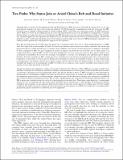Two Paths: Why States Join or Avoid China’s Belt and Road Initiative
Author(s)
Atkins, Eleanor; Fravel, M Taylor; Wang, Raymond; Ackert, Nick; Huang, Sihao
Downloadksad049.pdf (898.3Kb)
Publisher with Creative Commons License
Publisher with Creative Commons License
Creative Commons Attribution
Terms of use
Metadata
Show full item recordAbstract
Although China’s motives for developing the Belt and Road Initiative (BRI) have been well studied, scholars have yet to comprehensively examine why states seek to join the initiative. We fill this gap by examining how and why states join the BRI. Countries join by signing a Memorandum of Understanding (MOU) with China on cooperation under the BRI framework. These MOUs create few or no obligations for the states who sign them but increase the possibility of reaping future economic benefits. Thus, we argue that most states should join the BRI unless they view the costs of participation as higher. We hypothesize, and find support for, the argument that democracies are less likely to join because they view participating in a Chinese-led initiative as more costly than non-democracies. Our statistical analysis using a new dataset of BRI participants and paired case studies provides quantitative and qualitative support for this argument.
Date issued
2023-07Department
Massachusetts Institute of Technology. Department of Political SciencePublisher
Oxford University Press
Citation
Eleanor Atkins, M Taylor Fravel, Raymond Wang, Nick Ackert, Sihao Huang, Two Paths: Why States Join or Avoid China’s Belt and Road Initiative, Global Studies Quarterly, Volume 3, Issue 3, July 2023, ksad049.
Version: Final published version
ISSN
2634-3797
Keywords
General Medicine
Collections
The following license files are associated with this item: